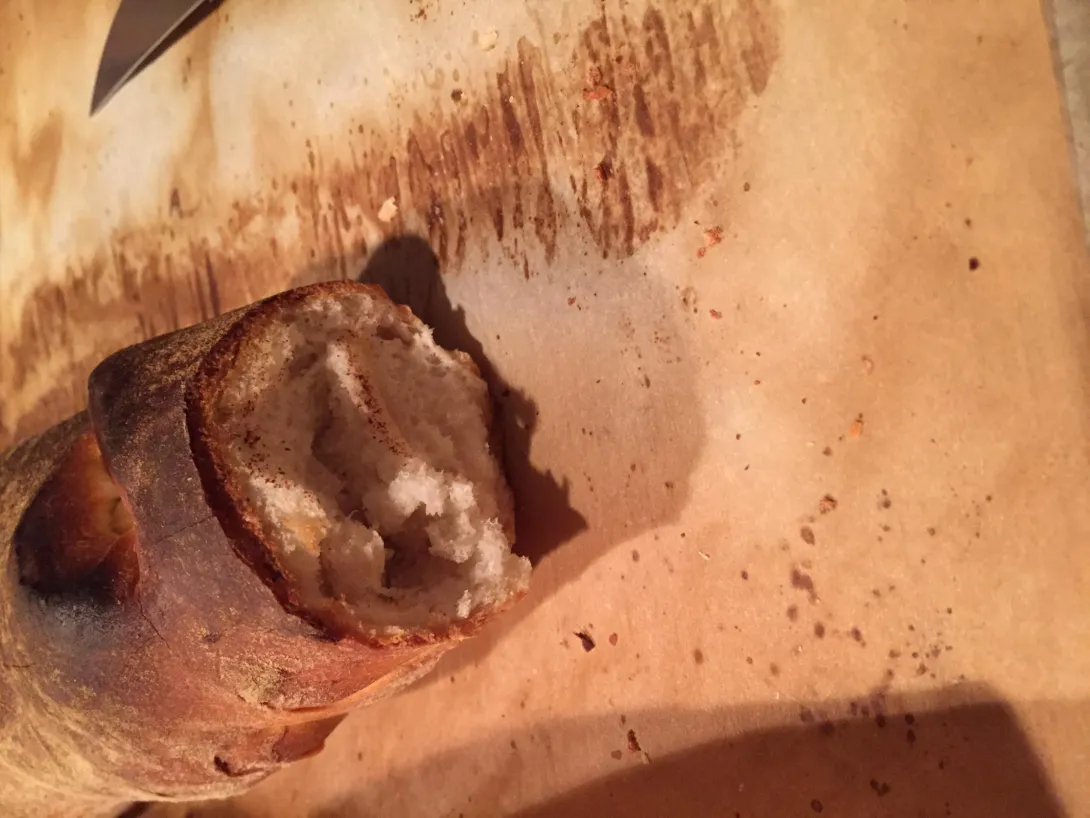
Hello everyone! I am a very new baker. I love to make bread and have made sweet bean filled buns (adzuki bread) many times. They are really good, but I find when it comes to other breads I have trouble. I don't know when to stop mixing. The dough looks smooth and shiny but the gluten window test doesn't work. I am trying to move on to making a simple baguette.
Bread flour 200gSalt 4gSugar 3gYeast 2gWater 130g Baked 20 minutes at 485 degrees on an oven sheet and parchment paper in the middle of the oven. I used this recipe and while it wasn't a complete disaster, the bread was obviously not a good baguette.The crust was black on the top, while the bottom had a nice yellow crust. Also, the crumb was slightly gummy.It tasted alright, surprisingly edible. If anyone has tips for my revenge, please let me know :)
Hi, can I recommend that you try a high hydration ciabatta before baguette. It's much easier to to get gluten structure with very highly hydrated doughs. There' also not a lot of shaping needed with ciabatta. In my opinion it's best to learn this bread first then move onto baguettes. You an surely focus on baguette however, in my opinion even what some people call a good or even great baguette is just average. If you want tips on baguette however, lets start with which kind of flour you are using (brand and type). Different flours require different kneading times. Who knows maybe you over kneaded :0.
Btw, from your photo your crust right off the bat is too dry - it's really thick. Oh another thing, better to leave sugar out it's not needed nor is it really part of a true baguette ;)
Maybe that is why I have more luck with enriched sweet breads, because they have higher hydration from butter+egg+milk?
I will try making a ciabatta, thank you for the advice!:)
I used King Arthur bread flour. I added water just until the dough started to come together. Here is a picture just before the first ferment.
KA Bread flour is pretty strong and can tell you that it really needs to be reckoned with to glutenize well at ~70% hydration levels. To give you an example, I will mix it with a kitchen aid for 4 minutes with 90% of the water to incorporate then let that sit for 20-30 minutes to autolyse. Then add the flour and yeast and mix for 8 minutes on the next level up. From here I add the remaining 10% of water at high speed for 6 minutes. After this amount of kneading the dough should be good to go :)
Here's what my KA Bread flour looks like after it has sat for 1 hour (btw 72% hydration - this is 500g flour + 360g water
just a little bit and let it proof a little more...
turned the pic as my imagination just couldn't see it, hope you don't mind...
I was on a phone and didnt even know the picture was flipped like that haha! Thank you! :)
I will try that out next time!
Burned on the top????
The sugar would make the bread more likely to burn, but it's also possible that you need to lower the baking rack. Also, you should verify the temperature of the oven with a separate oven thermometer. Might be too hot.
I didn't even think about checking the proper temperature or oven rack position before putting the bread in. There is a lot to think about at first! Thank you.
A little bit of water on the crust while the bread is baking will also help with the oven rise and prevent scorching. With a brush or with your hands--or even with a little spray bottle--moisten the top of the baguette with water before scoring and placing into the oven. You can also put in a pan with some boiling water directly in the oven to keep some steam on the inside, but the first method I describe is the simplest and should help at least a little bit.
If you're feeling particularly ambitious, search for mini oven's steam method, which seems to be quite a darling on this site, as it has garnered the approbation of nearly all who have used it.
Good luck !
Thank you! Spraying it with water is a good idea! I will try it out next time. Also I will check out the steam method!! Sounds fun :)